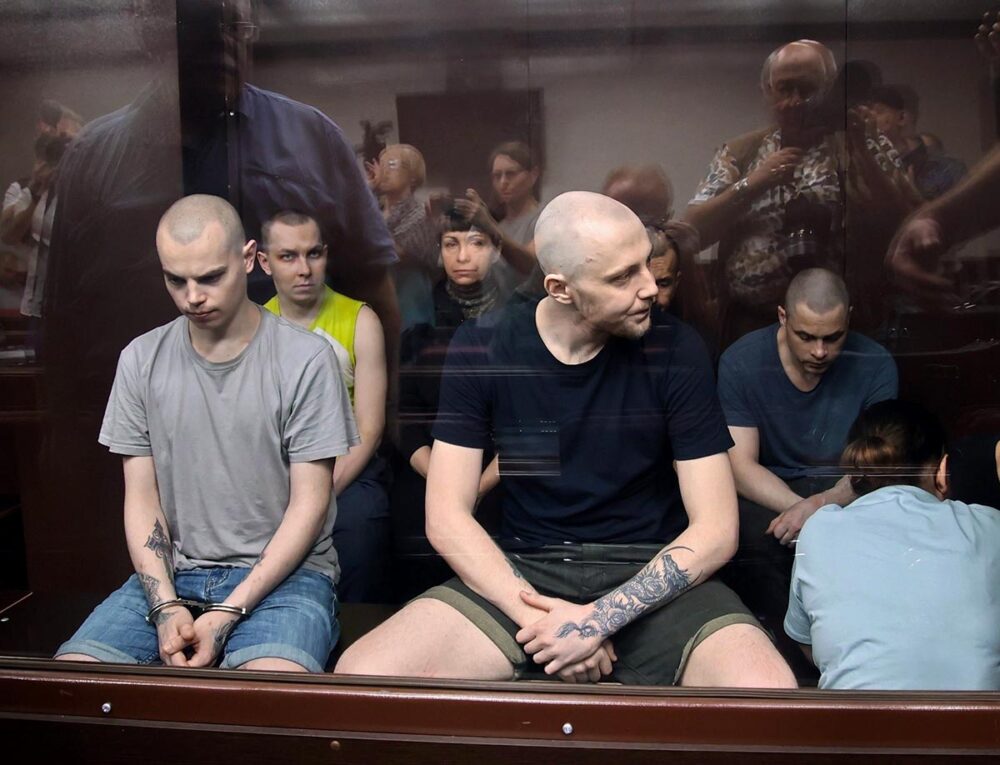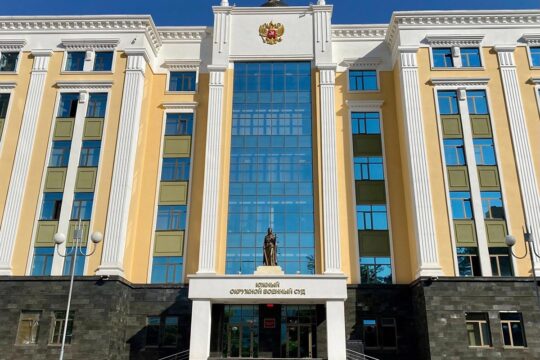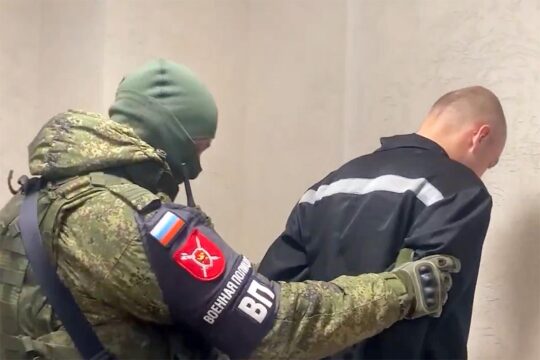Behind the aquarium glass, on the defendant's bench are 18 individuals, held in investigative isolators in Rostov-on-Don, Southern Russia. Most of these prisoners of war ended up in Russian custody in March or April 2022, shortly after the full-scale Russian invasion of Ukraine began.
On July 26, the Southern Military District Court held its first hearing in the case. Since the “annexation” of the Donetsk People's Republic (DNR) a year ago, the military court in Rostov-on-Don has become the main hub for hearing cases from what are officially called in Russia the «newly acquired» territories. In October 2022, when the prosecutors of the secessionist republic of Eastern Ukraine had completed the investigation into the 18 members of the “Aidar” battalion, it transferred the case first to a Donetsk court and then to the Rostov-on Don military court. As the 22 alleged members of the “Azov” battalion, they are accused of forcefully seizing power, changing the constitutional order of the DNR, and participating to a terrorist organization.
Created in May 2014, the territorial defence unit was named after the Aidar River in the Luhansk region of Eastern Ukraine, where it first operated as a volunteer formation. The battalion has been accused by Amnesty International of "widespread abuses", before being disbanded in 2015 and reorganized as the 24th Separate Assault Battalion within the Armed Forces of Ukraine. In August 2016, both the Aidar and Azov formations were declared as terrorist and extremist organizations by the DNR. But unlike Azov, the Aidar battalion is not currently included in the list of terrorist or extremist organizations in Russia.
A drone operator, and assistant grenadier, and more
Among the accused are Igor Gayokha, “commander of a mortar platoon”, Sergey Kalinchenko, “commander of the 2nd platoon of an assault company”, and Taras Radchenko, the “intelligence chief and assistant chief of staff”, according to the indictment.
Taras, 23, is the son of Igor Radchenko, who’s name has been mentioned before the same court, when a deputy commander of Aidar, Denis Muryga, said according to TASS Russian news agency that he ordered him to blow a bridge that resulted in the deaths of members of militia men in the Luhansk People's Republic, in March 2015. Muryga was sentenced, in June, to 16 years in a top-security prison for his involvement in an “illegal armed formation”.
Among the other accused are “grenade launchers” Vitaliy Gruzinov (also known in Ukraine as a journalist and activist, under the pen name of Kozak Vedmenko) and Sergey Nikityuk, “drivers” Yevgeniy Pyatigorets, Dmitry Fedchenko, Vitaliy Krokhalev, Vladislav Ermolinsky, “drone operator” Semen Zabayrachny, “assault trooper” Nikolay Chuprina, “assistant to the grenade launcher” Vyacheslav Bayduyk, “medic” Andrey Sholik, as well as “snipers” Vladimir Makarenko, Roman Nedostup, and Alexander Taranets. In addition to the 16 men, two female medics, Marina Mishchenko and Lilia Prutyan, are also facing charges.
Black masks, flashing lights and handcuffs
Justice Info’s could attend one of the hearings, on September 21.
Half an hour before the start of the hearing, two large trucks and two vans with law enforcement officers wearing black masks on the front seats arrived at the tribunal with flashing lights. According to lawyer Lyubov Kuptsova, who represents the interests of Dmitry Fedchenko, the convoys are adhering to unprecedented security measures. Male defendants are transported in handcuffs joined together and to the others by iron chains.
In total, the court only hold four hearings in the case, aimed at reading out the indictment and reclassifying the charges from the Donetsk Criminal Code to the Russian one. According to TASS Russian news agency, the defendants also expressed their stance on the accusations: only two battalion members pleaded guilty. Three others refrained from answering, while 13 considered themselves innocent. Now, the prosecution starts to present evidence.
“The majority of the accused ended up in the battalion through mobilization,” Kuptsova explains. According to the lawyer, most of the defendants do not understand what is happening and do not believe in the administration of justice. She adds that her client was tortured in detention in the DNR and that they will testify about this during further hearings.
The defendants on the bench appear calm, smile during conversations with their lawyers. The trial of the Aidar case is taking place in the same courtroom where members of the Azov battalion are being tried - only the composition of the court differs. Two women, the mothers of Taras Radchenko and Yevgeniy Pyatigorets, came to follow the hearing. A bailiff explains to one of them, a blonde woman in a baggy black sweater and glasses, that she cannot submit any documents to the court as she is not a participant in the process.
“She doesn’t understand anything. I'm not an artilleryman”
The hearing starts and the prosecutor says he received written statements from six witnesses stating that they cannot attend for various valid reasons. He requests that their statements given during the investigation stage, conducted in the DNR, be read out.
One of the summoned witnesses, Anastasia Pervenko, is described as "an acquaintance of Chuprina." Nikolay Chuprina objects: "It's impossible. Let her come to court and give her testimony." The court takes his position into account and rejects the prosecutor's testimony.
In the end, the court read out the testimonies of three witnesses. One of them, Lyudmila Nikityuk, is the mother of 30-year-old Sergey Nikityuk, a “driver”. According to her testimony, her son lived with her in Volnovakha, a city in southwestern Donetsk Oblast, Ukraine, until 2014. She stated that he joined the Aidar battalion in September 2021 and served as an artilleryman. According to Lyudmila, her son decided to go to the battalion because he had owed a significant amount of money to his acquaintances. She last spoke to him in late February 2022, and she was unaware of his whereabouts. Nikityuk himself, after the testimonies were read out, told the court that he did not discuss his life with his mother: "I had no debts. She doesn't understand anything about it. I'm not an artilleryman, after all."
“What’s the problem? It's a common Ukrainian word”
The testimony of Tatiana Kamyshenko, the partner of 49-year-old Vyacheslav Bayduyk, an alleged “assistant to the grenade launcher” according to the accusation, was also read out on September 21, at the prosecutor’s request. She said she met the defendant in November 2015 when he assisted her with repairing her vehicle. Then “he was called up for military service and sent to Volnovakha,” she explained. After his service, Bayduyk decided to stay in Volnovakha, and in 2016, they moved in together.
Initially, he worked as a delivery person at a store in town, then he started helping Kamyshenko cultivate mushrooms at home, which she then sold to acquaintances. In the summer of 2018, he was offered a military contract opportunity, she said, and he signed a contract with Aidar. After a year, Bayduyk attempted to engage in business again, but it didn't work out, so he returned to the military. “He came back home in December 2020, but the command sent him back to service. He went on vacation in May 2021 and then obtained his military ID in the Lviv Oblast,” the presiding officer read out. But according to the witness, he was no longer in a military nor in a territorial defense unit after that. Kamyshenko provided investigators from the DNR with copies of his contract with Aidar.
- From what date?, one of the defense lawyers asks.
- One is from August 1, 2018, for a one-year term. The second contract, written in Ukrainian, is signed on “Lypen 23” or July 23, 2020, answers the prosecutor.
- What does “Lypen” mean?, one of the lawyers from the front row asks.
- “July”, colleagues, the court, and even someone from the audience replies.
- Shouldn’t we translate?, one of the defense attorneys protests.
- What’s the problem? It's a common Ukrainian word, replies a colleague.
- You asked for the date, and you were given the date. What else?, the presiding judge concludes, putting an end to the dispute.
“My son got the dates wrong”
The last testimony read in court were given by Nikolay Zagrebaev, the son of 54-year-old Lilia Prutyan, presented as a “medic” in the case file. According to the prosecutor, he couldn't attend the court because he was "in the zone of a special military operation."
Zagrebaev stated that his mother signed a military contract at the end of 2015, but he didn't know her exact position. He didn't know much about his mother's life, and he said he learned about her joining the Aidar battalion only through social media: “She posted a photo in uniform on Facebook.” He couldn’t provide any of her documents. “In March 2022, people in civilian clothing took away her military ID, medal, medical documentation, and two folders with documents,” Zagrebaev told the investigators.
Responding to the testimony, Prutyan stated that her son got the dates wrong. She said she signed her first contract in February 2017 and firstly worked as an accountant. She became a combat medic in Aidar only in July 2020: “Yes, there was a photo on Facebook. In military uniform. There is no weapon or anything like that,” she told the court.
The next hearing in the case will take place on October 5, where the prosecution will continue presenting evidence.







